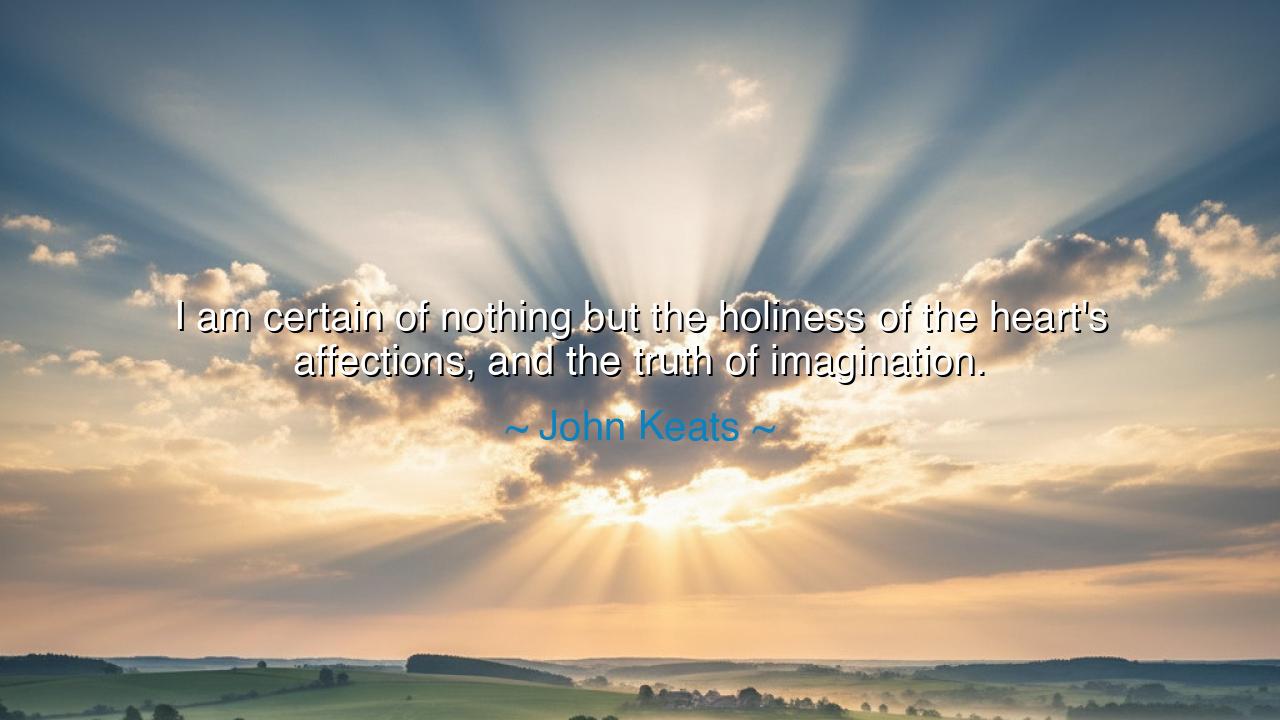
I am certain of nothing but the holiness of the heart's
I am certain of nothing but the holiness of the heart's affections, and the truth of imagination.






“I am certain of nothing but the holiness of the heart’s affections, and the truth of imagination.” Thus wrote John Keats, the young poet of beauty and sorrow, whose life was as brief as a rose in spring yet whose words have lived for centuries. In this radiant confession, Keats speaks not as a scholar of cold logic, but as a prophet of feeling and vision. He declares that in a world of uncertainty — where knowledge fades and reason falters — only two things remain sacred: the affections of the heart and the truth of imagination. Through these, he found meaning that neither science nor philosophy could give.
Keats lived in an age when reason reigned supreme — the Enlightenment had crowned intellect as king, and logic was thought to hold every answer. Yet Keats, standing at the dawn of Romanticism, dared to say that truth was not found in calculation but in emotion and imagination. He believed that the heart knows what the mind cannot measure. For him, love, compassion, and beauty were not illusions — they were the very pulse of truth itself. And the imagination, far from being a childish escape, was the sacred faculty that could perceive the divine behind appearances. To imagine was not to lie; it was to see more deeply, to glimpse the eternal within the fleeting.
The origin of this quote lies in a letter Keats wrote to his friend Benjamin Bailey in 1817, a time when he was wrestling with questions of truth, art, and faith. He had seen suffering, loss, and the fragility of life, and so he abandoned the arrogant certainty of philosophers for the humble wonder of the poet. “I am certain of nothing,” he wrote — not out of despair, but out of reverence. For Keats, certainty belonged only to the divine. All else — fame, wealth, opinion — was shadow and smoke. What endures are the affections that make us human and the imagination that lets us touch the infinite.
Consider, for a moment, Vincent van Gogh, who lived by a similar creed though he painted, not wrote. His mind was restless, his body frail, yet his heart overflowed with color, tenderness, and longing. He saw holiness in the smallest things — the gleam of a star, the curl of a sunflower — and through his imagination, he gave those humble visions eternal life. Like Keats, van Gogh believed that truth was not to be dissected but felt. Both men lived close to suffering, and yet they turned pain into beauty. Their art was their act of faith: that affection and imagination could still reveal light amid the world’s darkness.
Keats’s wisdom also speaks to our own time, when the mind is overwhelmed by information but starved of meaning. We live surrounded by knowledge, yet often feel hollow. We seek proof for everything and wonder why wonder itself fades. Keats reminds us that truth without love is barren, and intellect without imagination is blind. The “holiness of the heart’s affections” teaches us empathy — to feel the world deeply, to care for others as extensions of our own soul. The “truth of imagination” teaches us vision — to see possibilities beyond the present, to create beauty where none seems possible. Together, they make life sacred.
The ancients would have understood this. The Greeks spoke of phronesis, wisdom of the heart — the knowing that comes not from reason but from harmony with the divine order. The mystics of every age have said the same: that the heart is the true eye of the soul, and imagination the ladder by which we ascend toward heaven. Keats, though young and mortal, joined that lineage of seers who looked upon the world with both tenderness and awe. His poetry was not about escaping reality, but embracing it so fully that even sorrow became beautiful.
So, my listener, take this teaching to heart: cherish your affections and cultivate your imagination. Do not let cynicism dry your soul or reason alone rule your days. Love without fear, dream without shame, and look upon the world as Keats did — as a sacred mystery. Let your heart be the temple where truth is felt, and your imagination the window through which the infinite enters your life. For in the end, as Keats knew, knowledge fades, empires crumble, and logic dissolves — but love and imagination, eternal twins of the spirit, will carry the soul beyond the reach of time.






AAdministratorAdministrator
Welcome, honored guests. Please leave a comment, we will respond soon